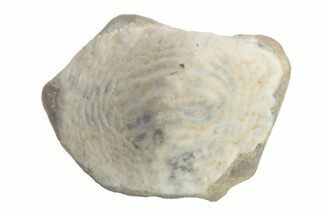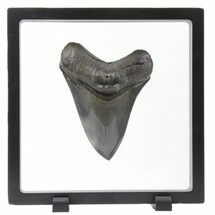This Specimen has been sold.
.97" Fossil Shark (Cretodus) Tooth - Carlile Shale, Kansas
This is a well preserved fossil tooth of the extinct mackerel shark, Cretodus sp., collected from the Carlile Shale in North Central Kansas. It's Cretaceous in age, or approximately 93 million years old. Teeth in this good of a condition are quite rare and don't come along often.
Comes with an acrylic display case.
Comes with an acrylic display case.
Cretodus is a genus of extinct mackerel shark that reached lengths somewhere between 15 and 22 feet. These sharks lived in the late Cretaceous seas of the Western Interior Seaway that bisected the continent which is now North America. Their teeth are rather rare and are denoted by a singular central blade and two lateral accessory lobes with a deeply cleaved root. They look quite similar to those of the Otodus sharks with which they share an order but little else. Cretodus belong to the family Cretoxyrhinidae, which hosts other genera of Western Interior Seaway sharks, such as Cretolamna and Cretoxyrhina.
While Cretodus sharks are commonly associated with the Carlile Shale of Kansas, they also make an appearance in the fossil record of the British Chalk, which dates from the mid to late Cretaceous.
These sharks were fearsome predators, much like their modern mackerel shark relatives. They likely preyed on bony fish and smaller marine reptiles, specifically Plesiosaurs and Mosasaurs.
While Cretodus sharks are commonly associated with the Carlile Shale of Kansas, they also make an appearance in the fossil record of the British Chalk, which dates from the mid to late Cretaceous.
These sharks were fearsome predators, much like their modern mackerel shark relatives. They likely preyed on bony fish and smaller marine reptiles, specifically Plesiosaurs and Mosasaurs.
SPECIES
Cretodus sp.
LOCATION
North Central Kansas
FORMATION
Carlile Shale
SIZE
.97" long
CATEGORY
SUB CATEGORY
ITEM
#203305
We guarantee the authenticity of all of our specimens.
 Reviews
Reviews












